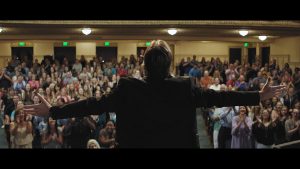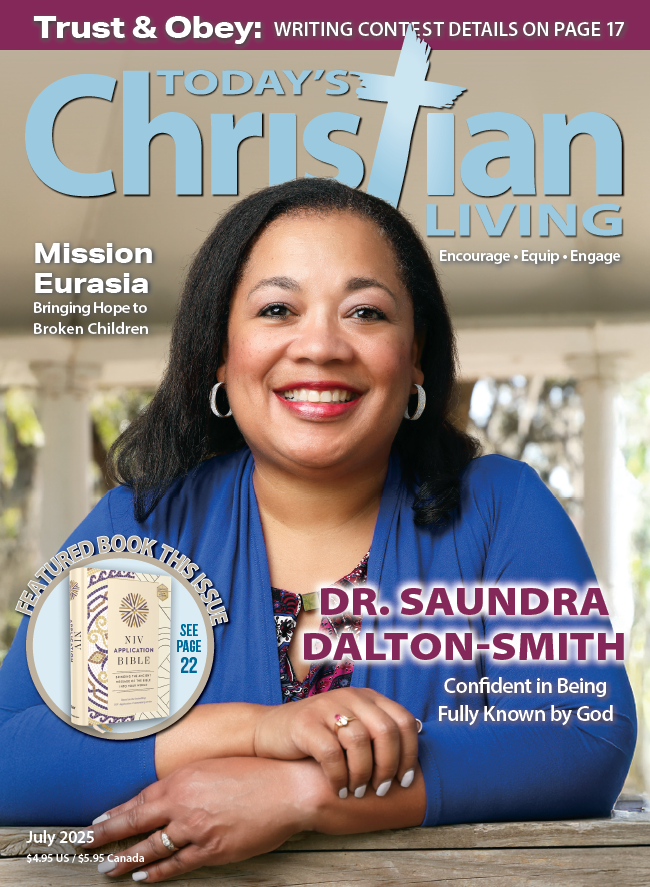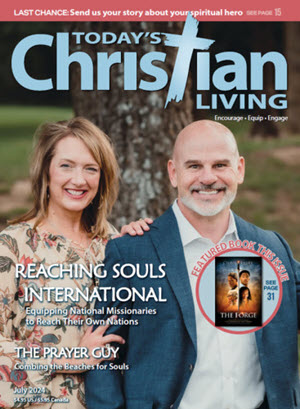New movie starring Kevin Sorbo confronts atheism.
By Dan Brownell
A new Christian movie, Let There Be Light tells the story of “the “world’s greatest atheist,” Dr. Sol Harkens, who grapples with the aftermath of a Near Death Experience (NDE) as the result of a car accident. During his NDE, he briefly meets and speaks with his dead son in a tunnel, and is then resuscitated. No longer able to deny that life exists after death, Harkens struggles to reconcile his atheism with his experience, which clearly refutes the godless worldview he has been teaching his followers for years. The crisis also brings Harkens face-to-face with his failed marriage and his estrangement from his living son.

Sol Harkens, “the world’s greatest atheist,” is bitter at the loss of his youngest son and turns his anger into an all-out attack on God. Here he participates in a debate, where he espouses his views.
The film stars Kevin Sorbo, who is best known for his role on the ’90s hit TV series Hercules: The Legendary Journeys and for his lead in the 2014 Christian blockbuster God’s Not Dead. Kevin’s wife, Sandra “Sam” Sorbo, co-wrote the screenplay with well-known Hollywood screenwriter Dan Gordon.
The Backstory on the Sorbos’ Spiritual Journey
Kevin became a Christian early in life, and his family was very involved in his church growing up. Sam on the other hand, didn’t have any Christian upbringing at all. She was raised Jewish until about 12, and it wasn’t until later that she began having spiritual questions.
“I went on a search for God in my early 20s, and ended up in church with a girlfriend, and that’s where Jesus found me,” Sam said. “I came to belief in God from a very argumentative position. I needed it proven.” This isn’t surprising, as she has an exceptionally inquisitive and analytical mind. In fact, before turning to modeling and acting, she studied biomedical engineering at Duke University, and she’s fluent in five languages. And for more than three years, she has hosted the daily nationally syndicated radio program The Sam Sorbo Show, where she leads discussions on current events and their impact on culture.
Finding His True Strength
Sam met Kevin on the set of Hercules, while playing the role of Serena. By then Sam was a Christian, and Kevin and Sam attended church together. About a year into their engagement, Kevin suffered three strokes and nearly died. It took him almost three years to recover, and it made going to church very challenging for him, especially because he was so well known. During his first visit back to church after leaving the hospital, he was hounded for autographs. To their relief, their pastor followed up with a sermon the next week discouraging the congregation from “stargazing.”
Kevin wrote a book about his strokes and recovery called True Strength: My Journey from Hercules to Mere Mortal — and How Nearly Dying Saved My Life. The 2011 release recounts how he struggled with God over his condition, but, as Kevin likes to say, “God won.” It wasn’t a journey of finding his faith, Sam explained. He always had faith, but he never needed it so desperately until this life-changing event occurred.
Kevin and Sam have three young children, two of whom appear in the movie as Dr. Harken’s sons. Sam plays Dr. Harken’s wife. In real life, Sam homeschools her children and is an outspoken supporter of the homeschooling movement and developing strong families. Sam has written two homeschooling books: They’re YOUR Kids: An inspirational Journey from Self-Doubter to Home School Advocate, and Teach From Love: A School Year Devotional for Families. Kevin and Sam are currently co-writing True Faith, a book about the challenges of raising a family in an anti-Christian culture.

The Sorbo Family: (l. to r.): Braeden, Kevin, Octavia, Sam, and Shane, with their dogs Hunter and Iggy. In the movie, Kevin plays Dr. Sol Harkens, while Sam portrays Sol’s wife. Braeden takes on the role of their oldest son, Gus, and Shane is cast as the dead son, Connor, whom Sol briefly converses with during his NDE experience.
A Movie Only God Could Make
“This is more than a Christian film,” Sam said. “This is a film made on faith, made by faith,” a statement underscored by the amazing turn of events that led to its production. Sam had been mulling over the idea for the plot of the movie for a while and then approached well-known screenwriter Dan Gordon to write the script. Gordon initially turned down the job, but changed his mind after Sam explained the idea to him.
Only two weeks later, a producer called Kevin to say that he wanted to do a faith film with him and asked if he had any ideas. Sam looked at Kevin and said, “That’s my movie!” Kevin and Sam flew to New York and pitched the idea, and just a half-hour later, they had a signed check.
“Now, I have to tell you,” Sam said, “in Hollywood, the money never chases the project. You’re always chasing the money, and you typically run out of breath before the money does. So this is a film that only God could have made happen. This is miraculous. And a year later, I’m sitting here with a finished film. It’s unbelievable.”
The Limits of Science
Kevin and Sam want their new movie to shine a spotlight on how our culture has developed such a strong anti-God and anti-Christian bias because of a faulty perception that science is all-knowing and infallible.
“We’re such skeptics now,” Sam said. “We’re taught that science knows everything, but there are a few things for sure: death, taxes, and that fact that science gets it wrong — often.”
The idea that science has eliminated God dominates college classrooms, as is portrayed in God’s Not Dead. But atheism isn’t limited to college campuses. It’s steeped in our Western culture and pervades every aspect of life. While God’s Not Dead argues against atheism from an intellectual point of view, Let There Be Light tackles the issue by exploring death, something that everyone — even atheists — know they will eventually face.
The movie is already showing potential for tremendous impact.
“What we’ve noticed in testing,” Sam said, “is that women love this movie, but men like it even more, which is just astonishing to us, because it depicts the struggle men have with being under God’s authority and coming to terms with that, and coming to terms with fatherhood and with being a husband. So it’s really resonating with men. For women out there, this is the movie you take your husband, your boyfriend, your brother, your father, your son to, that they will thank you for afterward. This is God’s work right here.”
The movie premiered Fri. Oct. 27. For more information, visit www.lettherebelightthemovie.com or Facebook at www.facebook.com/LTBLfilm.
ARE NEAR DEATH EXPERIENCES BIBLICAL?
Let There Be Light presents a long-overdue opportunity to clarify this controversial area of theology.
Screenplay co-writers Sam Sorbo and Dan Gordon included a near-death experience (NDE) in the storyline to show how an atheist might react when confronted with the inescapable truth that there really is a God and an afterlife. They were acutely aware of the controversy surrounding the reliability of “to-heaven-and-back” accounts and purposely ended the NDE in the tunnel before heaven, thereby omitting any heavenly scenes to avoid the possibility of misrepresentation.
But is even their limited portrayal of an NDE compatible with Scripture? By including an NDE in the plot, Let There Be Light presents a good chance for Christians to explore this issue from a biblically defensible position.
A Biblical View of NDEs
According to Mark Hitchcock, author of Visits to Heaven and Back: Are They Real?, a number of theories have been presented to explain NDE experiences through natural means, but “it doesn’t seem that all NDEs can be explained away by natural factors,” Hitchcock said. “The evidence to the contrary is simply too overwhelming to dismiss them all by psychological, pharmacological, or neurological explanations.”
Some respected theologians have accepted the validity of NDEs. For example, Dr. Gary R. Habermas and Dr. J.P. Moreland, co-authors of Beyond Death: Exploring the Evidence for Immortality, are leading Bible scholars who have researched this field extensively for decades and believe NDEs are real. That doesn’t definitively prove they exist, but it does indicate that they aren’t universally rejected by Bible scholars either. But that doesn’t necessarily mean that all NDE accounts are authentic.
“Habermas and Moreland maintain it’s possible that some aspects of NDEs are related to occultic spiritual realities and Satanic counterfeit but reject the notion that all NDEs are occultic and or unbiblical,” said Hitchcock. They point out that “Just as you can’t have fake money without real money, so you can’t have fake NDEs without real ones. You can’t counterfeit what doesn’t exist.”
According to Moreland, the Bible’s silence on NDEs doesn’t preclude them.
“I think the Bible’s silence is a complete non-issue,” Moreland explained. “The Scriptures cover thousands of years of time, and there is so little mentioned.… We’ve got just little tiny snippets. John says that if we recorded everything that Jesus ever did, the whole world would be filled with books.
“Sola Scriptura has been seriously misunderstood,” Moreland added. It doesn’t mean that if something isn’t mentioned in the Bible it’s wrong. But the information can’t contradict the Bible either. The Scriptures are our ultimate source on everything, but if there’s silence, we’re free to follow the evidence wherever it leads, he asserted.
Dr. Moreland gave a hypothetical example of archaeologists digging up artifacts in Jericho. If they find information that’s not in the Bible, that doesn’t mean it’s unbiblical. The information is valid. It’s just that the Bible doesn’t mention it.
“Silence is something I would expect because the Bible just doesn’t spend a lot of time talking about the nature of the afterlife,” he said. “And I think Paul’s not being able to speak about what he saw was because there were probably things told to him that were pretty dramatic. I think that we have to be careful not to be skeptical or gullible. I think either is wrong. I think we should be wisely open.”
Common Elements of NDEs
Those who have experienced an NDE commonly report that they travel through a tunnel, see flashbacks of their life, meet and converse with Jesus and/or a loved one, reach a barrier, experience a “life review,” and are sent back or choose to return to earth. When they return, they have a strong desire to tell others about their experience and undergo a change in the way they view life and death.
While every NDE doesn’t necessarily include all of these elements, in the movie, Dr. Sol Harkens’ NDE experience does include a number of them. The film’s depiction is compatible with the accounts of those who claim to have experienced an NDE, and the movie’s very limited portrayal of an NDE experience is within the scope of what Habermas and Moreland deem as biblically plausible.
NDEs Similar Across Cultures
According to Moreland, cultures around the world describe similar elements of NDEs. For example, “A lot of the Hindu experiences are experiences of a robed figure with a beard who is holding a book of judgment,” he said. This is contrary to Hindu religious and cultural expectations, so it seems to reinforce the objectivity of their reports.
Why Does God Allow NDEs?
The Lord may use an NDE to give people a second chance before they’re eternally condemned. This could account for life reviews. Dr. Moreland speculated, however, that NDEs could be a basis for greater judgment because if God were gracious enough to allow a person to have an NDE, then it’s reasonable to assume He will hold them even more accountable for the additional light they were given.
Moreland pointed out that John Burke’s book Imagine Heaven explains that life reviews don’t contradict Scripture, as is often suggested, because they don’t match or have the same purpose as the two judgments described in the Bible: the Bema Seat judgment (for rewards) and the Great White Throne judgment (for eternal condemnation). Rather, the life review is a warning to repent. It’s a highly convicting experience intended to lead one to face and deal with one’s sin. In a high percentage of the life review incidents, people report that the ordeal makes them acutely aware of how their words and actions have affected other people, which is in line with the Lord’s desire to bring people to repentance. As the Bible states, He is “not willing that any should perish, but that all should come to repentance” (2 Pet. 3:9 KJV).
The vast estimated number of NDEs reported point to God’s immense grace. According to Moreland, statistical estimates suggest that around 200,000,000 to 300,000,000 people worldwide have experienced an NDE.
What About Visits to Heaven?
Although Habermas and Moreland believe that NDEs are real, they also state that they “cannot be used as reliable guides to describe details about heaven or hell,” said Hitchcock. The two experts explained that “Interpretations of one’s experiences are notoriously tricky things. Interpretations of even everyday episodes sometimes vary from person to person. This by no means indicates that things don’t really happen as they appear, only that we should be very careful about reporting them and especially our opinions about them.”
The Bottom Line
In summary, it’s essential to test all things against Scripture. If something contradicts the Bible, it’s certainly false. But if the Bible is silent about it, it’s at least possible that it could be true. In those cases, we may carefully follow the evidence where it leads. Also, keep in mind that because of the Bible’s silence on NDE’s, we can’t be dogmatic, so we should extend grace to fellow believers who have differing opinions on the matter.









